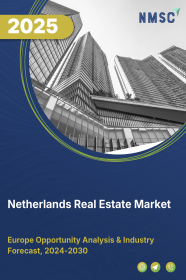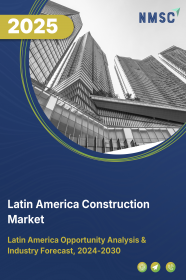
Netherlands Real Estate Market by Property Size (Small (<500 sq. ft.), Medium (500–2000 sq. ft.), Large (2000+ sq. ft.)), Property Type (Residential, Commercial, Land, Industrial), by Business Type (Buying, Selling, Leasing, Renting and Real Estate Investment), by Ownership (Owner-Occupied Properties, Rental Properties, Co-ownership), and Others – Opportunity Analysis and Industry Forecast, 2025–2030
Industry: Construction & Manufacturing | Publish Date: 02-Sep-2025 | No of Pages: 124 | No. of Tables: 174 | No. of Figures: 99 | Format: PDF | Report Code : CM1224
Market Definition
The Netherlands Real Estate Market size was valued at USD 170.1 million in 2023, and is predicted to reach USD 329.3 million by 2030, at a CAGR of 9.9% from 2024 to 2030.
The real estate industry constitutes a multifaceted market involving the acquisition, development, and management of residential and commercial properties. This expansive sector includes residential real estate, catering to individuals and families, as well as commercial and industrial real estate, focused on business operations and manufacturing. Real estate development involves the creation and enhancement of properties, while real estate investment encompasses acquiring properties for financial gain.
Additionally, a range of professional services, such as those provided by real estate agents and property managers, contributes to the industry's dynamics. Influenced by economic trends, demographic shifts, and regulatory factors, the real estate market is a complex landscape where various stakeholders engage in activities that shape urban environments, support economic growth, and provide investment opportunities.
Urban Expansion and Infrastructure Modernization Accelerate Market Growth in the Netherlands
The ongoing urban expansion in the Netherlands is reshaping the country's real estate landscape. Cities such as Amsterdam, Rotterdam, Utrecht, and The Hague are witnessing steady population growth driven by internal migration and international influx. This urban shift fuels demand for high-density residential developments, modern commercial hubs, and mixed-use spaces that cater to evolving lifestyle and work patterns.
Simultaneously, the Dutch government continues to prioritize infrastructure modernization. Investments in integrated public transportation networks, energy-efficient utilities, and smart mobility solutions are making both urban cores and suburban areas more attractive for development. Enhanced connectivity to employment zones, educational institutions, and cultural centres significantly boosts property demand and values. Together, urban growth and infrastructure upgrades are reinforcing the momentum of the Netherlands real estate sector.
Rise of Digital Property Ecosystems Enhances Market Accessibility
Digital transformation is playing a pivotal role in reshaping the real estate experience across the Netherlands. The proliferation of sophisticated online property platforms has made property searches, transactions, and management more transparent and user-friendly. These platforms offer detailed listings, virtual property tours, real-time alerts, and advanced filtering tools, allowing buyers, renters, and investors to make quick and informed decisions.
The integration of data analytics, user personalization, and fintech solutions such as mortgage calculators and investment simulators has empowered consumers to navigate the property market independently and confidently. As digital adoption deepens across all age groups, the role of tech-enabled platforms in driving market participation and transaction volumes continues to expand.
Regulatory Hurdles and Macroeconomic Volatility Challenge Market Stability
The Dutch real estate market faces constraints arising from stringent regulatory frameworks and economic pressures. Complex zoning regulations, limited land availability, and lengthy permit procedures can delay project timelines and increase development costs. Moreover, restrictions on rental pricing and foreign ownership are influencing market dynamics, particularly in densely populated urban regions.
On the economic front, fluctuations in interest rates, inflationary pressures, and global uncertainties impact borrowing capacity and investment sentiment. These factors contribute to cautious behavior among homebuyers and developers, potentially slowing down market activity. Managing compliance while navigating economic headwinds remains a key challenge for real estate stakeholders across the Netherlands.
Smart Urban Planning and Sustainability Drive Future Growth Potential
The Netherlands is at the forefront of integrating sustainability and innovation in urban development. Nationwide efforts to create energy-efficient, climate-resilient, and technologically advanced environments are unlocking new avenues for real estate expansion. Government-backed smart city projects and eco-friendly urban policies are encouraging the development of smart homes, green offices, and low-emission infrastructure.
These initiatives resonate strongly with rising environmental awareness and changing consumer preferences. Developers are embracing green building certifications, circular construction practices, and smart energy systems to meet future demand. As municipalities continue to embed sustainability into their planning frameworks, the real estate market stands to benefit from increased investor interest, long-term value creation, and diversified asset offerings across both residential and commercial segments.
Competitive Landscape
The market players operating in Netherlands real estate market include CBRE Group, Inc, Jones Lang LaSalle Incorporated, Bouwinvest Real Estate Investors B.V, Vesteda N.V, WDP N.V. (Warehouses De Pauw), Wereldhave N.V, Savills Plc, Eurocommercial Properties N.V, Syntrus Achmea Real Estate And Finance B.V, NSI N.V, De Key B.V, Amvest B.V, Xior Student Housing N.V, EDGE Technologies B.V, OVG Real Estate B.V, MVGM Vastgoedmanagement B.V, Capital Value B.V, Provast B.V, Domus Magnus Group B.V, VastNed Retail N.V.
Netherlands Real Estate Market Key Segments
By Property Size
-
Small (<500 sq. ft.)
-
Medium (500–2000 sq. ft.)
-
Large (2000+ sq. ft.)
By Property Type
-
Residential
-
Apartments/Flats
-
Single-Family Homes
-
Multi-Family Homes
-
Condominiums
-
Townhouses
-
Vacation Homes
-
-
Commercial
-
Office Spaces
-
Retail Spaces
-
Co-working Spaces
-
Warehouses
-
-
Land
-
Urban Plots
-
Suburban/Rural Plots
-
-
Industrial
-
Manufacturing Plants
-
Distribution Centers
-
Data Centers
-
By Business Type
-
Buying
-
Selling
-
Leasing
-
Renting
-
Real Estate Investment
-
Direct Property Investment
-
Real Estate Investment Trusts (REITs)
-
By Ownership
-
Owner-Occupied Properties
-
Rental Properties
-
Co-ownership
By Property Value
-
Affordable Housing
-
Luxury Housing
-
Ultra-Luxury Housing
By End User
-
Individual Buyers
-
First-time Homebuyers
-
Repeat Buyers
-
Luxury Buyers
-
Seniors/Retirees
-
-
Business Entities
-
Startups
-
SMEs
-
Large Corporations
-
-
Government
-
Civic Projects
-
Affordable Housing Initiatives
-
-
Institutional Investors
Key Players
-
CBRE Group, Inc.
-
Jones Lang LaSalle Incorporated
-
Bouwinvest Real Estate Investors B.V.
-
Vesteda N.V.
-
WDP N.V. (Warehouses De Pauw)
-
Wereldhave N.V.
-
Savills Plc
-
Eurocommercial Properties N.V.
-
Syntrus Achmea Real Estate And Finance B.V.
-
NSI N.V.
-
De Key B.V.
-
Amvest B.V.
-
Xior Student Housing N.V.
-
EDGE Technologies B.V.
-
OVG Real Estate B.V.
-
MVGM Vastgoedmanagement B.V.
-
Capital Value B.V.
-
Provast B.V.
-
Domus Magnus Group B.V.
-
VastNed Retail N.V.
REPORT SCOPE AND SEGMENTATION:
|
Parameters |
Details |
|
Market Size in 2023 |
USD 170.1 Million |
|
Revenue Forecast in 2030 |
USD 329.3 Million |
|
Growth Rate |
CAGR of 9.9% from 2024 to 2030 |
|
Analysis Period |
2023–2030 |
|
Base Year Considered |
2023 |
|
Forecast Period |
2024–2030 |
|
Market Size Estimation |
Million (USD) |
|
Growth Factors |
|
|
Companies Profiled |
20 |
|
Market Share |
Available for 10 companies |
|
Customization Scope |
Free customization (equivalent up to 80 working hours of analysts) after purchase. Addition or alteration to country, regional, and segment scope. |
|
Pricing and Purchase Options |
Avail customized purchase options to meet your exact research needs. |

















 Speak to Our Analyst
Speak to Our Analyst

























